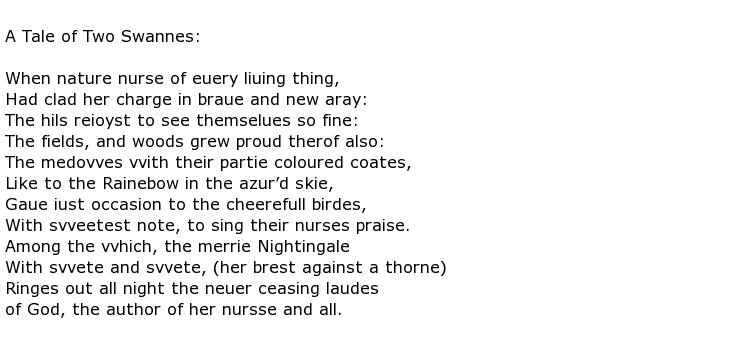 William Vallans was a poet, salter and antiquarian who hailed from England.
William Vallans was a poet, salter and antiquarian who hailed from England.
There is very little recorded about his life but it is believed that he was born sometime during the mid- to late-16th century, in the Hertfordshire town of Ware. Although he grew up working in the businesses of trading antiques and salt, he enjoyed writing poetry and had a poem called

published, possibly in 1590, in London. This was, almost certainly, his most significant piece of work. It was a very long poem written in unrhymed hexameters and appears to portray the authors intention, or ambition, to leave England. This announcement of leaving his home shores has been compared by some critics to the last days, or the song of, a dying swan.
Vallans used this poem to draw attention to the state of a number of towns in his home county of Hertfordshire, lamenting on the number of grand properties that were in the hands of the Queen or her nobles. It cannot be confirmed but it is believed that Vallans left England shortly after the publication of this poem. Here are the opening lines of

Literary historians believe that this poem was one of the first of a kind, in that Vallans was one of the earliest poets to employ the blank verse technique in poetry, although this method had been used earlier in dramatic productions. The author was a great admirer of another English poet who was around at the same time by the name of Abraham Fraunce. Fraunce was responsible for the translation of some Latin Odes, written by Thomas Watson, and Vallans quoted some of this work in his Swannes poem. There is a distinct similarity in styles exhibited in both poets’ work.
It is odd that Vallans is often described in reference books as “William Vallans, salter”, suggesting that the trade in salt was his main occupation, as opposed to being a poet. There is, in fact, very little evidence of his work anywhere although some can be found in the “closed section” of the British Library. Here you will find another example of his “protest” style of writing. This time his grievance is on behalf of the author of a book named Survey of London. Vallans claimed that John Stowe was unfairly rewarded for his great work.
One other means for Vallans to get his verse seen by the reading public was to add some verses to a book called Whartons Dreame which was published in 1578. Adding so-called “prefatory verses” to another author’s book was fairly common at this time in literary history, all over Europe, and was seen as an acceptable way of making a poet known even though the work is not within his own book.
Further evidence of work by Vallans can be found in the grandly titled piece called

This was first published in London in 1615, and reprinted in 1616.
There is no record of the date of William Vallans’s death.

